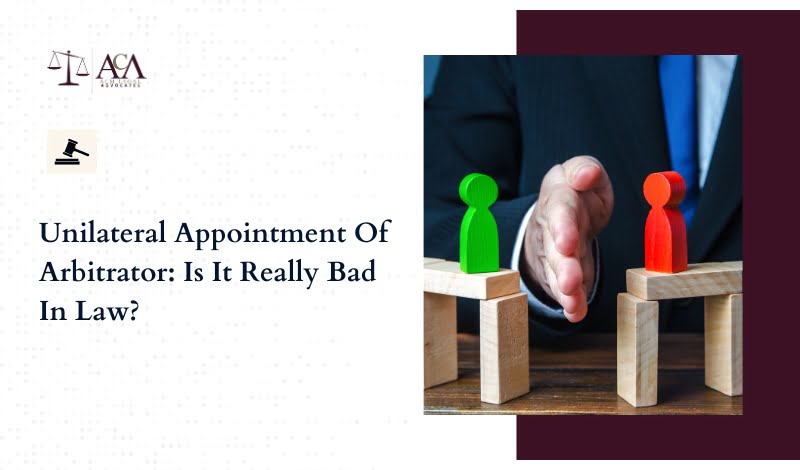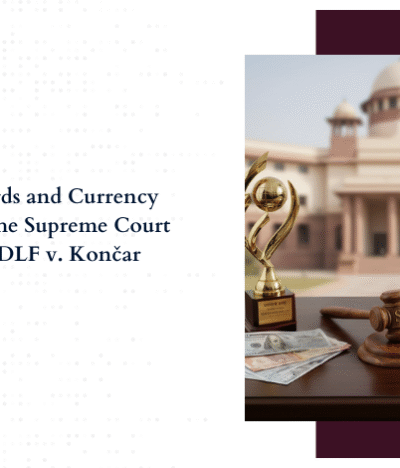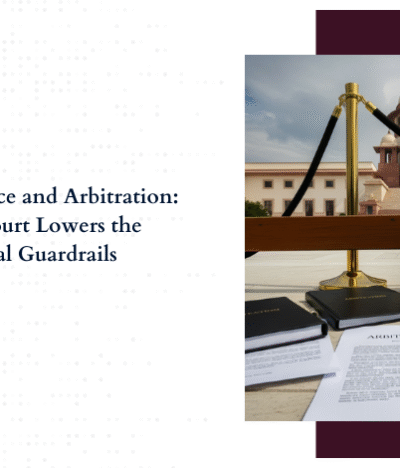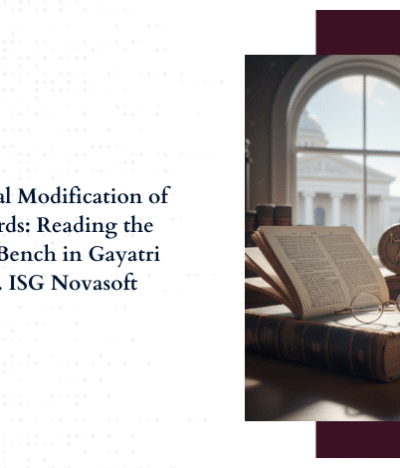Introduction To Arbitration And Appointment Of Arbitrator
Arbitration is a process where a dispute is submitted by an agreement of parties to arbitrator(s) who pass the binding award. Arbitration is the most used means of Alternative Dispute Resolution (ADR) where parties seek amicable settlement outside Courts. Arbitration is consensual in nature; it takes place only when both parties agree to it. Parties form an arbitration agreement where they outline the guidelines for the whole procedure, appointment of arbitrator, seat, venue etc.
Under the WIPO Arbitration Rules, for appointment of arbitrator, parties have the liberty to choose a sole arbitrator and if they choose to appoint three arbitrators, then each party will appoint one arbitrator and both of those arbitrators will appoint one presiding arbitrator. If both parties or the arbitrator fail to appoint an arbitrator or a presiding officer, then the Court will undertake appointment of arbitrator. In case of domestic arbitration, the High Courts will decide and, for the matter of international arbitrator, the Supreme Court will decide the arbitrator.
Unilateral Appointment of Arbitrator
According to Arbitration and Conciliation Act 1996, Section 10 which deals with the appointment of arbitrator, parties are free to determine the number of arbitrators. It can be a sole arbitrator or in odd numbers only. Section 11 states about appointment of an arbitrator but none of the sections directly deals with unilateral appointment of the arbitrator. According to section 18, both parties must be treated equally and the hallmark of arbitration process lies with independence and impartiality of the arbitrator, whose decision is final and binding. Unilateral appointment is generally considered bad in law.
There are numerous cases where unilateral appointment of arbitrator has been quashed by Hon’ble courts: –
Supreme Court in the case of PERKINS EASTMAN ARCHITECTS DPC Vs. HSCC (India) Ltd. upheld the importance of impartiality of an arbitrator, which can be achieved when the parties to the dispute nominate an arbitrator of their choice, both parties have equal right in it.
Supreme Court in the case of TRF Ltd. Vs. Energo-Engg. Projects Ltd. held that parties to the dispute cannot appoint a person interested in the matter as an arbitrator. This case laid down the foundation for barring unilateral appointment of arbitrator after the 2015 amendment to the Arbitration & Conciliation Act, 2015.
Why Is Unilateral Appointment Of Arbitrator Bad In Law?
Through unilateral appointment of an arbitrator, the party who appoints gains an upper hand in a case which is totally unfair to the other party. This increases more chances of biasness. Appointment of arbitrator is done by the procedure laid down in the arbitration agreement which parties to the disputes have signed after agreeing on the terms and conditions. If the parties have mentioned a particular way in which the appointment of the arbitrator is to be done, then that procedure will be followed and challenging it later by any party at any stage won’t be acceptable. It is crucial to understand that when one party have unilaterally appointed an arbitrator then the award passed by that arbitrator might be biased and might further led to litigation. That is why to prevent the chances of abuse of law, both the parties should mutually decide the arbitrator with free consent.
Delhi High Court in the case of Proddatur Cable TV Case, upheld the decision of the Supreme Court in Perkins case. Here, the petitioner approached the High Court for a dispute arising from the unilateral appointment of arbitrator by the opposite party. In this case, while upholding the decision of the Supreme Court, the High Court stated that unilateral appointment by an authority, which is interested in the outcome of the case is impermissible in law. It was further observed that the arbitration clause cannot override the guiding principle of impartiality and fairness.
UNICTRAL Arbitration Rules (1976) provides for a comprehensive set of rules where parties agree to arbitration proceedings if any dispute arises out of their legal relationship. The rule covers every aspect of the arbitral process, including the appointment of an arbitrator. Article 6 to 8 covers appointment of arbitrator but none of them talks about unilateral appointment. It allows appointment of one arbitrator by each party with the presiding arbitrator appointed by agreement or by a designated authority.
International Chamber of Commerce (ICC) Rules 2021, in Article 11 referred as the general provision states that every arbitrator must remain impartial and independent to the parties involved. Before appointment of arbitrator, an arbitrator shall sign a statement of acceptance, availability, impartiality and independence. According to article 13, clause 2, the Secretary General may confirm the arbitrators nominated by the parties or pursuant to their particular agreements.
In the 246th Report of the Law Commission of India, which stated that “there are certain minimum levels of independence and impartiality that should be required of the arbitral process, regardless of the parties’ apparent agreement.” This ensures parties liberty and their equal treatment.
What if the unilateral appointment is mentioned in the arbitration agreement? Will the appointment still be considered bad in law?
Section 34 of the Arbitration and Conciliation Act, 1996 talks about setting aside an arbitral award, in recourse to a court against an arbitral award can be taken only through setting it aside. When an arbitrator has been appointed by one party only and that stands wrong according to law, then the award passed by the unilaterally appointed arbitrator can be accordingly set aside. Provision of section 34 of the Arbitration and Conciliation Act, 1996 shall be allowed only when it is absolutely necessary.
Different Perspective Of Courts On Appointment Of Arbitrator
In the case of Arjun Mall Retail Holdings Pvt. Ltd. & Ors. Vs. GUNOCEN INC. read with case of Airport Metro Express Vs. DMRC, 2022 (1) SCC 131, it was held that Section 34 of the Act, scope of interference by the courts, is very limited and only if there is any patent illegality in the Arbitral Award, then only it is required to be touched upon. In that case, even if it is accepted that the appellants had raised an objection to the appointment of Arbitrator by sending a letter to him, but the fact remains that the appointment was never questioned before or challenged under the provisions of Section 11(6) of the Act, nor did the appellants participate in arbitral proceedings, despite having knowledge of the same.
If any party has knowledge about the appointment of arbitrator and kept quite during the whole process and then challenges it on a later stage then that award won’t be set aside. In the case of NAVAL KISHORE Vs. INDIA CEMENT CAPITAL & FINANCE LTD. & ORS. the petitioner had constructive notice of the change of arbitrator and, therefore, it cannot be said to be unilateral as the public at large was aware of the same.
If the unilateral appointment is stated in the arbitration agreement or the arbitration clause and the same has been signed by both parties then it is considered to be right, and must be followed accordingly. The same cannot be challenged later on if the award is not in favour of the opposite party. The Supreme Court in the case of BHUPINDER SINGH BINDRA Vs. UOI held that it is settled law that the court cannot interpose and interdict the appointment of arbitrator, whom the parties have chosen under the terms of the contract unless there is legal misconduct of the arbitrator, fraud, disqualification etc. Therefore, a party will have the power to appoint a sole arbitrator if the same is agreed and there is a provision in the arbitration agreement.
In the case of Kanodia Infrastructure Ltd. v. Dalmia Cement (Bharat) Ltd. was submitted that during the course of arbitral proceedings, the petitioner never challenged the appointment of Arbitrator under Sections 11,13,14 & 16 of the Arbitration and Conciliation Act, 1996 nor disqualification of the same Arbitrator was sought under Section 12(5) of the Act. There was no objection to the appointment of the learned arbitrator raised before and when the award was pronounced against the petitioner, it was challenged to be set it aside under section 34, which will not be allowed. The same was upheld in the case of D.K. Gupta & Anr. Vs. Renu Munjal where Delhi High Court held that the petitioner has been appearing before the learned Arbitrator in conduct of the arbitral proceedings and has never raised such objections till at the far end of the proceedings and thus has no right now to allege the arbitrator.
If at the time of entering into the contract, the parties agree that one of them would appoint a sole arbitrator then, it would not be open for the other party to contest the same at a later stage.
Conclusion
When we talk about arbitration and appointment of arbitrator, unilateral appointment seems to be wrong because arbitration is a process where both parties get treated equally, but if a party voluntarily gave up his right of appointment or if it’s really late to appoint, then the other party can’t be challenged to appoint a sole arbitrator unilaterally. Whether the unilateral appointment is correct or not totally depends on the facts of the cases and the agreement between the parties. It will be safe to say that the dynamics of unilateral appointments have changed and now, in correct circumstances, it’s not bad in law.
Contributions:
Anjali Singhvi – Associate
Divya Singh – Intern






